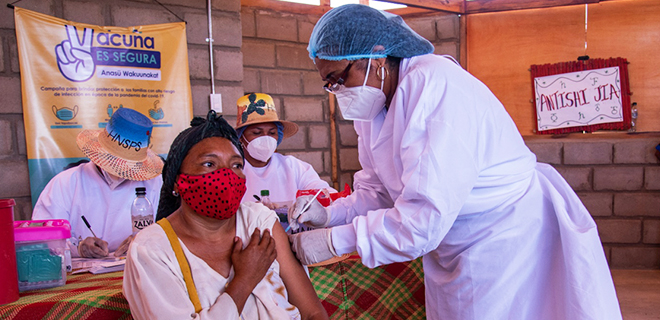The workshop, Epidemics and Pandemic Prevention Preparedness and Response: How to Maximize the Health Impact of Social Protection Systems, preceded the P4H-TEG meeting, on October 4 and 5. It was a collaboration jointly held by ILO and WHO and showcased a further collaboration between the P4H Network and SPARKS Network. It was presented both in-person at ILO headquarters and online. The workshop elucidated the interconnectedness and interdependence of universal social protection (USP) and UHC as well as the links among social protection, employment and the social determinants of health in the context of epidemics and PPPR.
To open the meeting, Mia Seppo, assistant director-general for jobs and social protection at ILO, spoke about epidemics and PPPR as a context in which to promote the benefits and need for intersectoral collaboration and, more broadly, the need for equity in the protection of health, jobs and incomes. Ailan Li, assistant director-general for UHC, healthier populations at WHO, insisted on acknowledging the role of social determinants of health and social protection in epidemics and PPPR.
Drawing on lessons from well-known pandemics, speakers emphasized the significant roles of social protection and social determinants of health in reducing the burden of tuberculosis and HIV/AIDS. Workshop participants agreed on the need for enhanced coordination and integration, as well as decent employment and dialogue between employers and workers for the extension of SHP coverage. Last, a call was made for more equitable and financially sustainable social protection systems for epidemics and PPPR, with strong legal frameworks and principles advancing UHC and USP. In addition, the P4H-TEG working group on financing PPPR organized a segment presenting existing PPPR financing mechanisms, and the need to strengthen health and social protection systems, and, more broadly, the well-being of societies.
Throughout the two-day open forum workshop, discussions were supported by presentations on social protection systems in Chile, Kenya, Lebanon, Oman and Senegal. The exchanges elucidated the vital role of social protection and health systems in ensuring income security and affordable access to health care, the importance of formalizing the informal economy, and the value of an integrated approach to improve coordination within and across sectors and administrative levels.
More details about this presentation can be found in p4h.world P4H events’ page.


